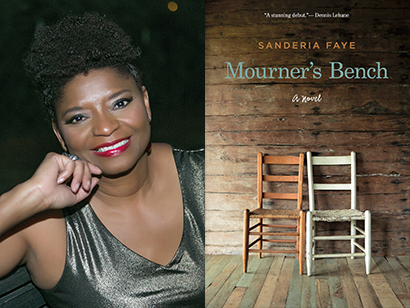FAYETTEVILLE, Ark. – Mourner’s Bench: A Novel by Sanderia Faye has been nominated for the prestigious Hurston/Wright Legacy Award, given each year to the best books in Black literature. Mourner’s Bench is a nominee in the debut fiction category, along with Naomi Jackson’s The Star Side of Bird Hill and Chigozie Obioma’s The Fishermen. The winner will be announced at an Award Ceremony on Oct. 21. Past winners include Denise Nicholas, Chimamanda Ngozi Adichie, and Kwame Dawes.
The novel, set the in the fictional town of Maeby, Arkansas, tells the story of young Sarah Jones as she navigates the growing tensions of small-town southern life in the 1960s. Both smarter and more serious than her years (a “fifty-year-old mind in an eight-year-old body,” according to her mother), Sarah is torn between the traditions, religion, and work ethic of her community and the progressive civil rights and feminist politics of her mother.
When organizers from the Student Non-Violent Coordinating Committee (SNCC) come to town, Sarah can’t help but be caught up in the turmoil. Most of her neighbors just want to keep the peace, and her pastor, Reverend Jefferson, calls the SNCC organizers “the evil among us.” But her mother, along with local civil rights activist Carrie Dilworth, the SNCC organizers, and real-life figures such as Daisy Bates and attorney John Walker — indeed most of the country — seem determined to push Maeby toward integration.
Mourner’s Bench is Arkansas history packaged in a compelling coming-of-age story. Jennifer Jensen Wallach, who co-edited Arsnick: The Student Nonviolent Coordinating Committee in Arkansas, said: “It should be required reading for anyone seeking to understand a little-known chapter of civil rights history. Sanderia Faye’s portrait of life in a black community in rural Arkansas during the era of segregation is well-drawn, and her characters are unforgettable.”
Kirkus Reviews calls Mourner’s Bench “an absorbing meditation on the meaning of religion in a small town as well as a keen-eyed perspective on the way one African-American community encountered the civil rights movement. An astute coming-of-age tale set against an all-too-relevant background.” Literary magazine The Rumpus says, “Faye’s writing is detailed and descriptive, depicting moments that richly capture life in a small segregated and impoverished town. … Mourner’s Bench is a well-researched and commendable debut effort that expands and complicates the body of literature written about the Civil Rights movement by asking readers to lend equal consideration and weight to the roles age, gender, and religion played.”
Mourner’s Bench was published in September 2015 and is available from the University of Arkansas Press. Orders can be placed online (www.uapress.com) or by calling the Chicago Distribution Center (800-621-2736). University of Arkansas faculty, staff, and students are encouraged to order using the code YOUOFA for a 25 percent discount.
About the University of Arkansas Press: The University of Arkansas Press was founded in 1980 as the book publishing division of the University of Arkansas. A member of the Association of American University Presses, it has as its central and continuing mission the publication of books that serve both the broader academic community and Arkansas and the region.
About the University of Arkansas: The University of Arkansas provides an internationally competitive education for undergraduate and graduate students in more than 200 academic programs. The university contributes new knowledge, economic development, basic and applied research, and creative activity while also providing service to academic and professional disciplines. The Carnegie Foundation classifies the University of Arkansas among only 2 percent of universities in America that have the highest level of research activity. U.S. News & World Report ranks the University of Arkansas among its top American public research universities. Founded in 1871, the University of Arkansas comprises 10 colleges and schools and maintains a low student-to-faculty ratio that promotes personal attention and close mentoring.
Topics
Contacts
Charlie Shields, marketing assistant
University of Arkansas Press
479-575-7258,
Steve Voorhies, manager of media relations
University Relations
479-575-3583,
